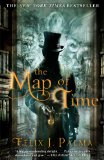Summary | Excerpt | Reviews | Beyond the Book | Readalikes | Genres & Themes | Author Bio

A Novel
by Felix J. PalmaChapter 1
I
ANDREW HARRINGTON WOULD HAVE GLADLY died several times over if that meant not having to choose just one pistol from among his father's vast collection in the living room cabinet. Decisions had never been Andrew's strong point. On close examination, his life had been a series of mistaken choices, the last of them threatening to cast its lengthy shadow over the future. But that life of unedifying blunders was about to end. This time he was sure he had made the right decision, because he had decided not to decide. There would be no more mistakes in the future because there would be no more future. He was going to destroy it completely by putting one of those guns to his right temple. He could see no other solution: obliterating the future was the only way for him to eradicate the past.
He scanned the contents of the cabinet, the lethal assortment his father had lovingly set about assembling after his return from the war. He was fanatical about these weapons, though Andrew suspected it was not so much nostalgia that drove him to collect them as his desire to contemplate the novel ways mankind kept coming up with for taking one's own life outside the law. In stark contrast to his father's devotion, Andrew was impassive as he surveyed the apparently docile, almost humdrum implements that had brought thunder down to men's fingertips and freed war from the unpleasantness of hand-to-hand combat. Andrew tried to imagine what kind of death might be lurking inside each of them, lying in wait like some predator. Which would his father have recommended he blow his brains out with? He calculated that death from one of those antiquated muzzle-loading flintlocks, which had to be refilled with gunpowder and a ball, then tamped down with a paper plug each time they were fired, would be a noble but drawn-out, tedious affair. He preferred the swift death guaranteed by one of the more modern revolvers nestling in their luxurious velvet-lined wooden cases. He considered a Colt Single Action revolver, which looked easy to handle and reliable, but discarded it when he remembered he had seen Buffalo Bill brandishing one in his Wild West Shows. A pitiful attempt to reenact his transoceanic exploits with a handful of imported Red Indians and a dozen lethargic, apparently opium-drugged buffalo. Death for him was not just another adventure. He also rejected a fine Smith & Wesson: that was the gun that had killed the outlaw Jesse James, of whom he considered himself unworthy, as well as a Webley revolver, specially designed to hold back the charging hordes in Britain's colonial wars, which he thought looked too cumbersome. His attention turned next to his father's favorite, a fine pepperbox with rotating barrels, but he seriously doubted whether this ridiculous, ostentatious-looking weapon would be capable of firing a bullet with enough force. Finally, he settled on an elegant 1870 Colt with mother-of-pearl inlays that would take his life with all the delicacy of a woman's caress.
He smiled defiantly as he plucked it from the cabinet, remembering how often his father had forbidden him to meddle with his pistols. But the illustrious William Harrington was in Italy at that moment, no doubt reducing the Fontana de Trevi to a quivering wreck with his critical gaze. His parents' decision to leave on their trip to Europe the very day he had chosen to kill himself had also been a happy coincidence. He doubted whether either of them would ever decipher the true message concealed in his gesture (that he had preferred to die as he had lived - alone), but for Andrew it was enough to imagine the inevitable look of disgust on his father's face when he discovered his son had killed himself behind his back, without his permission.
He opened the cabinet where the ammunition was kept and loaded six bullets into the chamber. He supposed that one would be enough, but who knew what might happen. After all, he had never killed himself before. Then he tucked the gun, wrapped in a cloth, inside his coat pocket, as though it were a piece of fruit he was taking with him to eat later on a stroll. In a further act of defiance, he left the cabinet door open. If only he had shown this much courage before, he thought. If only he had dared confront his father when it had mattered, she would still be alive. But by the time he did so, it was too late. And he had spent eight long years paying for his hesitation. Eight years, during which his pain had only worsened, spreading its slimy tendrils through him like poison ivy, wrapping itself around his insides, gnawing at his soul. Despite the efforts of his cousin Charles and the distraction of other women's bodies, his grief over Marie's death refused to be laid to rest. But tonight it would all be over. Twenty-six was a good age to die, he reflected, contentedly fingering the bulge in his pocket. He had the gun. Now all he needed was a suitable place to perform the ceremony. And there was only one possible place.
Excerpted from The Map of Time by Felix J Palma. Copyright © 2011 by Felix J Palma. Excerpted by permission of Atria Books. All rights reserved. No part of this excerpt may be reproduced or reprinted without permission in writing from the publisher.
Your guide toexceptional books
BookBrowse seeks out and recommends the best in contemporary fiction and nonfiction—books that not only engage and entertain but also deepen our understanding of ourselves and the world around us.